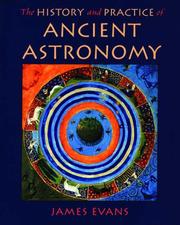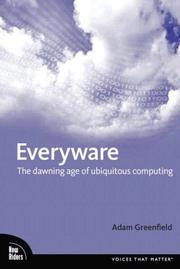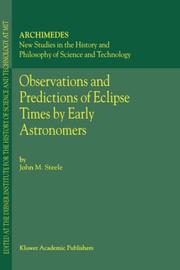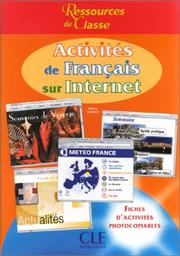| Listing 1 - 9 of 9 |
Sort by
|
Periodical
ISSN: 00218286 Year: 2014 Publisher: Cambridge: Science history publ,
Abstract | Keywords | Export | Availability | Bookmark
 Loading...
Loading...Choose an application
- Reference Manager
- EndNote
- RefWorks (Direct export to RefWorks)
Journal for the history of astronomy devoted to the history of astronomy from earliest times to the present, and to history in the service of astronomy. Its subject matter extends to such allied fields as the history of the relevant branches of mathematics and physics, and the use of historical records in the service of astronomy.
Astronomy --- 520.9 --- Sciences Astronomy History --- Physics --- Astronomy.
Book
ISBN: 0860784371 9780860784371 Year: 1994 Volume: 454 Publisher: Aldershot (Hants): Variorum,
Abstract | Keywords | Export | Availability | Bookmark
 Loading...
Loading...Choose an application
- Reference Manager
- EndNote
- RefWorks (Direct export to RefWorks)
Astronomy, Medieval. --- Astronomy, Medieval --- 520.9 --- Medieval astronomy --- Sciences Astronomy History

ISBN: 1283121441 9786613121448 019987445X 9780199874453 0195095391 9780195095395 0199879990 0197732305 Year: 1998 Publisher: New York Oxford Oxford University Press
Abstract | Keywords | Export | Availability | Bookmark
 Loading...
Loading...Choose an application
- Reference Manager
- EndNote
- RefWorks (Direct export to RefWorks)
James Evans explores the evidence for the astronomy of the ancient past and how astronomy was practised. Emphasis is placed on the material culture of ancient astronomy from ancient Babylon to the European Renaissance era.
Astronomy, Ancient. --- Ancient astronomy --- Astronomy, Ancient --- 520.9 --- Sciences Astronomy History --- Astronomy [Ancient ]

ISBN: 9780321384010 0321384016 Year: 2006 Publisher: Berkeley, CA : New Riders,
Abstract | Keywords | Export | Availability | Bookmark
 Loading...
Loading...Choose an application
- Reference Manager
- EndNote
- RefWorks (Direct export to RefWorks)
520.9 --- informatica --- digitale samenleving --- maatschappijwetenschappen --- informatica, informatietechnologie - overige onderwerpen --- Computers --- Ubiquitous computing. --- Social aspects. --- Ubiquitous computing --- Pervasive computing --- UbiComp (Computer science) --- Electronic data processing --- Embedded computer systems --- Social aspects --- Distributed processing

ISBN: 0792362985 9048154545 9401595283 Year: 2000 Publisher: Dordrecht Kluwer
Abstract | Keywords | Export | Availability | Bookmark
 Loading...
Loading...Choose an application
- Reference Manager
- EndNote
- RefWorks (Direct export to RefWorks)
Eclipses have long been seen as important celestial phenomena, whether as omens affecting the future of kingdoms, or as useful astronomical events to help in deriving essential parameters for theories of the motion of the moon and sun. This is the first book to collect together all presently known records of timed eclipse observations and predictions from antiquity to the time of the invention of the telescope. In addition to cataloguing and assessing the accuracy of the various records, which come from regions as diverse as Ancient Mesopotamia, China, and Europe, the sources in which they are found are described in detail. Related questions such as what type of clocks were used to time the observations, how the eclipse predictions were made, and how these prediction schemes were derived from the available observations are also considered. The results of this investigation have important consequences for how we understand the relationship between observation and theory in early science and the role of astronomy in early cultures, and will be of interest to historians of science, astronomers, and ancient and medieval historians.
Astronomy, Ancient --- Eclipses --- 520.9 --- Spherical astronomy --- Occultations --- Ancient astronomy --- Sciences Astronomy History --- Astronomy, Ancient. --- Eclipses. --- History. --- Observations, Astronomical. --- Astronomy—Observations. --- History, general. --- Astronomy, Observations and Techniques. --- Astronomical observations --- Observations, Astronomical --- Annals --- Auxiliary sciences of history

ISBN: 2090331143 9782090331141 Year: 1999 Publisher: Paris: CLE international,
Abstract | Keywords | Export | Availability | Bookmark
 Loading...
Loading...Choose an application
- Reference Manager
- EndNote
- RefWorks (Direct export to RefWorks)
1 p.
Computer assisted instruction --- Regional documentation --- France --- 804.0-07 --- #KVHA:Internet; Frans --- #KVHA:Taalonderwijs; Frans --- 520.9 --- Frans --- didactiek --- fran 837.1 --- internet --- fran 485.2 --- 804.0-07 Frans: taalonderwijs; taalverwerving --- Frans: taalonderwijs; taalverwerving --- informatica, informatietechnologie - overige onderwerpen --- Frans - grammatica, gemengde materialen woordenschat en grammatica
Book
ISBN: 0860782557 131524134X 1351894765 1351894773 9780860782551 Year: 1989 Volume: 307 Publisher: Northampton: Variorum,
Abstract | Keywords | Export | Availability | Bookmark
 Loading...
Loading...Choose an application
- Reference Manager
- EndNote
- RefWorks (Direct export to RefWorks)
Astrometry --- Astronomy, Arab. --- Astronomy, Medieval. --- Astronomy --- History. --- -Astronomy --- -Astronomy, Arab --- Astronomy, Medieval --- 520.9 --- 520.953 --- Medieval astronomy --- Arab astronomy --- Astronomy, Arabic --- Physical sciences --- Space sciences --- Positional astronomy --- Spherical astronomy --- History --- Sciences Astronomy History --- Sciences Astronomy History Arabia --- Astrometry - Arab countries - History. --- Astronomy - Europe - History.
Multi
ISSN: 0179261X ISBN: 3805003277 9783805003278 Year: 1993 Volume: 28 Publisher: Nettetal: Steyler,
Abstract | Keywords | Export | Availability | Bookmark
 Loading...
Loading...Choose an application
- Reference Manager
- EndNote
- RefWorks (Direct export to RefWorks)
Verbiest, Ferdinand --- Astronomie [Chinese ] --- Astronomie chinoise --- Astronomy [Chinese ] --- Astronomy --- 520.9 --- Academic collection --- #GBIB: jesuitica --- #SML: CCL --- #SML: Verbieststichting --- S13B/0411 --- S13B/0413 --- 52 <09> --- Early works to 1800 --- Sciences Astronomy History --- China: Christianity--Ferdinand Verbiest --- China: Christianity--Scientific activities and works of SJ --- Astronomie. Astrofysica. Ruimteonderzoek. Geodesie--Geschiedenis van .. --- Verbiest, Ferdinand, --- Nan, Huai-jen, --- Nan, Huairen, --- 南懷仁, --- Astronomers --- Belgium --- Biography --- Verbiest, Ferdinand $c S.J. --- 페르비스트 --- フェルビースト, フェルジナンド --- 南, 怀仁 --- 南, 懷仁 --- Astronomie. Astrofysica. Ruimteonderzoek. Geodesie--Geschiedenis van . --- Astronomie. Astrofysica. Ruimteonderzoek. Geodesie--Geschiedenis van --- Golvers, Noël --- Astronomy - Early works to 1800. --- Verbiest (ferdinand) --- Critique et interpretation
Book
ISBN: 0792313801 9048140986 9401734674 9780792313809 Year: 1992 Volume: 135 Publisher: Dordrecht: Kluwer Academic Publishers,
Abstract | Keywords | Export | Availability | Bookmark
 Loading...
Loading...Choose an application
- Reference Manager
- EndNote
- RefWorks (Direct export to RefWorks)
The attribution of the Speculum Astronomiae to Albertus Magnus became a controversial issue only recently, when the great neo-Thomist historian Pierre Mandonnet suggested -- without any antecedents -- that the author was Roger Bacon rather than Albert. Mandonnet's theses were refuted by Lynn Thorndike and have since then been the subject of widespread discussion. The present historiographical case-study considers this debate in the light of an analysis of texts by Albert himself, as well as other important authors, such as Bacon, Bonaventura, Thomas Aquinas, Witelo, Campanus of Novara, and others, which shows how widespread the general concept of the influence of the stars and other astrological ideas to be found in the Speculum were. Most of the scientific ideas of the Middle Ages were based on principles derived from the notion of celestial influence and its consequences. The Speculum drew the fundamental outlines of this discipline into a theoretical and bibliographical introduction -- no small achievement -- and was consequently greeted with great interest and used as a standard reference book for many centuries. Set against the background of discussions taking place in the 1260s, within the Dominican Order as well as in the Faculties of Arts, Zambelli removes all doubt that the Speculum was written by Albert, possibly with some collaboration.
Occultism and science --- Astrology --- Science, Medieval --- Occultisme et sciences --- Astrologie --- Sciences médiévales --- History --- Histoire --- Albertus, --- Science, Medieval. --- History. --- -Occultism and science --- -Science, Medieval --- 133.52 --- 091:133.52 --- 133.509 --- 520.9 --- Medieval science --- Science and occultism --- Science --- Horoscopy --- Astronomy, Medieval --- Occultism --- Astrologie. Horoscopen. Dierenriem --- Handschriften i.v.m. astrologie --- Philosophy & psychology Astrology History --- Sciences Astronomy History --- Albertus Magnus, Saint --- 091:133.52 Handschriften i.v.m. astrologie --- 133.52 Astrologie. Horoscopen. Dierenriem --- Sciences médiévales --- Albert, --- Alberthus, --- Alberto, --- Albertus Magnus, --- Magnus Albertus, --- Velikiĭ Albert, --- Speculum astronomiae. --- Albert the Great --- Philosophy, medieval. --- Philosophy, Asian. --- History, general. --- Medieval Philosophy. --- Non-Western Philosophy. --- Philosophy of Science. --- Philosophy. --- Medieval philosophy. --- Philosophy and science. --- Occultism and science - History. --- Astrology - History.
| Listing 1 - 9 of 9 |
Sort by
|

 Search
Search Feedback
Feedback About UniCat
About UniCat  Help
Help News
News